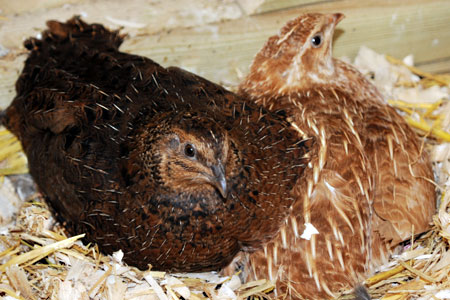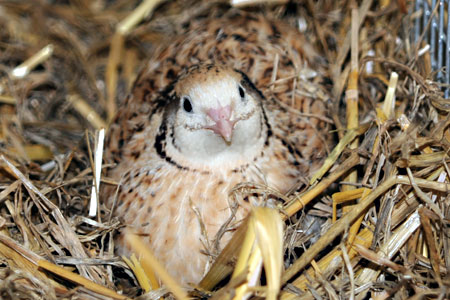Welcome to Relaxed Farming
- Alpacas
- Chickens
- Dairy Goats
- Ducks
- Geese
- Pigs
- Pygmy Goats
- Quail
- Rabbits
- Sheep
- Turkeys
- Polytunnel
- Photo Stories
- Video Stories
- Food
- Smallholding Map
- 2013
- 2014


- August
- September
- October
- November
- December
- January
- February
- March
- April
- May
- June
- July
- August


- 1
- 2
- 3
- 4
- 5
- 6
- 7
- 8
- 9
- 10
- 11
- 12
- 13
- 14
- 15
- 16
- 17
- 18
- 19
- 20
- 21
- 22
- 23
- 24
- 25
- 26
- 27
- 28
- 29
- 30
- 31
Wednesday, 2nd July 2014
You may remember that back at the start of December our Japanese Coturnix quail went to live with a neighbour of ours. They obviously have been living in perfect conditions because one of the females (the darker one in the first photo) has gone broody and for the last two weeks has been sitting on eggs. And then yesterday she was joined by the paler one. We took these photos at our neighbours this morning. Quail don't tend to go broody as much as many types of chickens do and the majority of quail breeders hatch out their eggs in an incubator so it is fabulous that these two are showing such broody behaviour. We are assuming the eggs are fertile (the two males in the group have been seen mating with the females) and the darker bird has certainly been very good at staying on the nest. Quail eggs take 18 days to grow and then hatch and so hopefully by the end of the weekend we may have some chicks.
The parent birds in this group are a fabulous variety of colours and patterns, the one in the photo on the right is a third example of how they can look, and so if we do get chicks we are hoping for a similar spread of colour.
Back on our smallholding our own Bobwhite quail are no more!!! Having lost the females and then having to cull the males due to a nasty but unknown bacterial infection, we then had a very poor hatch rate from the eggs we had set in the incubator before the females died. We ended up with six chicks all of whom have since died as well. They were housed in our barn aviary which had been scrubbed and disinfected and so our conclusion has to be that the group as a whole was simply not strong!!!
If we do have success with the Japanese chicks we are going to try to have a set up where they can be outside more on the grass in order that they get as natural a diet as possible. The Coturnix varieties are known for being quite hardy so we hope this will work.

